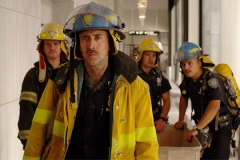|
Newest Reviews:
New Movies -
The Tunnel
V/H/S
The Tall Man
Mama Africa
Detention
Brake
Ted
Tomboy
Brownian Movement
Last Ride
[Rec]³: Genesis
Hara-Kiri: Death of a Samurai
Indie Game: The Movie
Abraham Lincoln: Vampire Hunter
Old Movies -
Touki Bouki: The Journey of the Hyena
Drums Along the Mohawk
The Chase
The Heiress
Show
People
The Strange Affair of Uncle Harry
Pitfall
Driftwood
Miracle Mile
The Great Flamarion
Dark Habits
Archives -
Recap: 2000,
2001, 2002,
2003, 2004
, 2005, 2006,
2007 , 2008
, 2009 ,
2010 , 2011 ,
2012
All reviews alphabetically
All reviews by star rating
All reviews by release year
Masterpieces
Screening Log
Links
FAQ
E-mail me
HOME
| |
World Trade Center
(Oliver Stone, 2006)
 Perhaps the
least likely candidate among American auteurs to make this particular 9/11
movie, Oliver Stone delivers a satisfying portrait of Americans’ ability to
weather the storm with World Trade Center.
Telling the true story of two NYPD officers who found themselves trapped under
the collapsed wreckage of the Twin Towers, the film is affecting in surprisingly
subtle ways. Stone’s filmmaking here is the least ostentatious that he’s
ever done, but it’s rather unimpeachable as a result. In his sure hands, the
opening montage of the Manhattan skyline is a brief, quietly glorious city
symphony. The space under the rubble is just as well-defined. Stone grounds the
audience in the claustrophobic ruins with his protagonists, turning its black
expanses into an almost literal hell that occasionally erupts into flames. The
sequences set underground stretch on for a virtual eternity, making the viewer
long for the eventual rescue of the officers, or at least the next scene set
above ground. The film’s sharp editing links the rescue efforts, the concerned
families, and the trapped men, simultaneously making the flashbacks and dreams
that provide their respite the audience’s own relief from imprisonment. Perhaps the
least likely candidate among American auteurs to make this particular 9/11
movie, Oliver Stone delivers a satisfying portrait of Americans’ ability to
weather the storm with World Trade Center.
Telling the true story of two NYPD officers who found themselves trapped under
the collapsed wreckage of the Twin Towers, the film is affecting in surprisingly
subtle ways. Stone’s filmmaking here is the least ostentatious that he’s
ever done, but it’s rather unimpeachable as a result. In his sure hands, the
opening montage of the Manhattan skyline is a brief, quietly glorious city
symphony. The space under the rubble is just as well-defined. Stone grounds the
audience in the claustrophobic ruins with his protagonists, turning its black
expanses into an almost literal hell that occasionally erupts into flames. The
sequences set underground stretch on for a virtual eternity, making the viewer
long for the eventual rescue of the officers, or at least the next scene set
above ground. The film’s sharp editing links the rescue efforts, the concerned
families, and the trapped men, simultaneously making the flashbacks and dreams
that provide their respite the audience’s own relief from imprisonment.
 Termed a
political filmmaker from the get-go Stone seems to be working here to actively
suppress his personal politics. This magnanimous gesture on the director’s
part helps to sell the film’s attempt to recapture the sense of community that
defined both the rescue effort and the day of the event. Every aspect of
Stone’s film reeks of conviction, yet there’s nothing sanctimonious about
it. In his choices to narrow the focus of the story he’s telling, he’s
elided any trace of controversy but has also emphasized the humanity of those
that he focuses on. His cast downplays personality to maximize empathy,
collectively creating an honorable, almost classical portrait of American
resolve. Every once in a while, voices on the periphery threaten to disturb this
unified front. Stone offers glimpses of people calling out for vengeance or
seeking refuge in religion, but they are almost alien presences in the context
that he’s created. The techniques employed might be somewhat questionable, but
the end result is a film that, while slightly dull once the rescue effort
begins, does effectively spin its events so that the audience can achieve a
cathartic release. Given that Americans are still very much grappling with the
aftermath of those attacks, Stone’s efforts seem less manipulative than
honorable. Termed a
political filmmaker from the get-go Stone seems to be working here to actively
suppress his personal politics. This magnanimous gesture on the director’s
part helps to sell the film’s attempt to recapture the sense of community that
defined both the rescue effort and the day of the event. Every aspect of
Stone’s film reeks of conviction, yet there’s nothing sanctimonious about
it. In his choices to narrow the focus of the story he’s telling, he’s
elided any trace of controversy but has also emphasized the humanity of those
that he focuses on. His cast downplays personality to maximize empathy,
collectively creating an honorable, almost classical portrait of American
resolve. Every once in a while, voices on the periphery threaten to disturb this
unified front. Stone offers glimpses of people calling out for vengeance or
seeking refuge in religion, but they are almost alien presences in the context
that he’s created. The techniques employed might be somewhat questionable, but
the end result is a film that, while slightly dull once the rescue effort
begins, does effectively spin its events so that the audience can achieve a
cathartic release. Given that Americans are still very much grappling with the
aftermath of those attacks, Stone’s efforts seem less manipulative than
honorable.
64
Jeremy Heilman
8.16.06
|